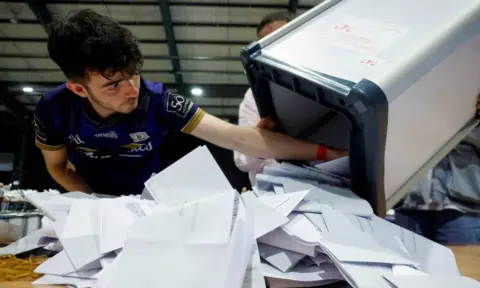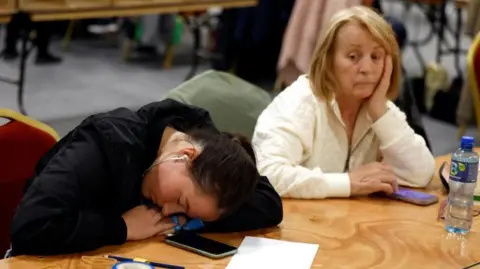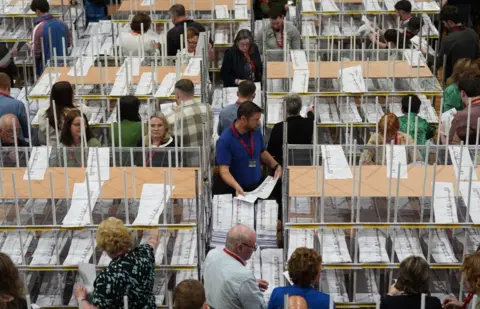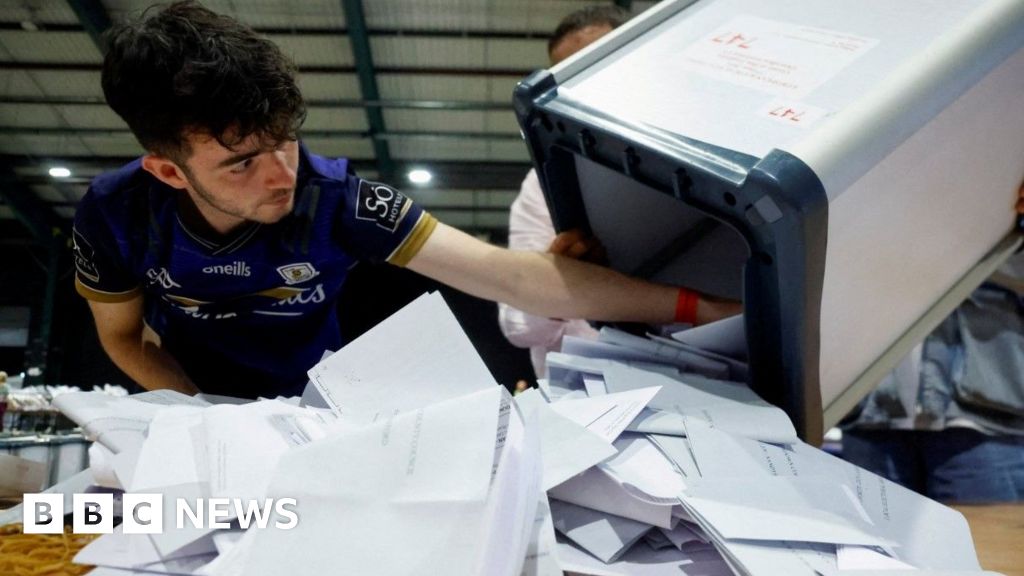By Aoife Moore, BBC News NI Dublin Correspondent
 Reuters
Reuters Counting is under way in the Republic of Ireland for the European elections.
It is also continuing for local council elections after counting began on Saturday.
Voters headed to the polls in three elections on Friday.
As well as picking candidates to send to the European Parliament, they voted to elect a swathe of new councillors and, for the first time, some were asked to decide on a directly-elected mayor to represent them.
The first of the local election results were declared on Saturday.
So far, just over a fifth of the 949 seats have been declared.
 Reuters
ReutersAnalysis: ‘Panic’ within Sinn Féin camp
It appeared from the early boxes being opened here that something has happened to the Sinn Féin vote.
Sinn Féin polling has gone down in the last couple of months, from those highs that we saw last year.
There has been a feeling of panic within the Sinn Féin camp.
The big story of the weekend will be centred around the independents.
How well the independents have done, Fine Gael perhaps taking over from Fianna Fáil but there will be questions for Mary Lou McDonald on Monday about what happened during these council elections.
‘Shattered’
The polls will provide political parties with an insight into voter sentiment.
The current Irish government has been in place since June 2020, when Fine Gael, Fianna Fáil and the Green Party voted to enter a coalition together.
The next election must be held by March 2025.
Early indications suggest the governing parties will not suffer losses on a scale that many had predicted.
Public Expenditure Minister and Fine Gael TD (member of parliament), Paschal Donohoe, said the results so far showed Fine Gael was not a spent political force.
“Overall, the portrayal that some have offered of Fine Gael as a tired party – that narrative, that claim, has been shattered by the results that we’re seeing potentially coming through at the moment,” he said.
“And the other narrative that there’s anything inevitable about Sinn Féin being in government – that’s been shattered too.”
‘Lessons that can be learned’
Sinn Féin, the main opposition party, is expected to have more councillors elected to local authorities, but not as many as it wanted or expected.
Sinn Féin TD for Donegal, Pearse Doherty, told RTE’s Six One news programme that the party would have to “dust themselves down” and look at “lessons that can be learned”.
“We will make some gains in some counties and they will be well won and well fought for, but it is not the result we hoped for,” he said.
“There will be a lot of disappointment for some of our new candidates who were trying to break new ground.
“The key thing is that there are strong indicators as well coming from the three European constituencies and there is a lot to play for.”
 PA
PAAlthough voters turned out on Friday, results for the European elections cannot be released until every country has finished voting later.
Voting began in The Netherlands on 6 June, with 20 other countries heading for the ballot boxes on Sunday.
Fourteen MEPs will be elected across three constituencies to represent Ireland at the next European Parliament.
Five will represent the constituency of Midlands North-West, a 15-county constituency in which 27 candidates ran.
Five will represent Ireland South, where 23 candidates ran across 10 counties.
And four will represent Dublin, where there were also 23 candidates on the ballot.
Why are Ireland’s EU results being counted late?
Some 373 million people across the European Union are eligible to vote in this election.
Together, voters in its 27 member states will elect 720 MEPs. It is the second biggest democratic election in the world after India.
However, under European law, results cannot be announced until all countries have finished voting.
Voting takes place across four days, and began with the Netherlands on 6 June and Ireland on 7 June.
Some countries voted on 8 June and 20 others on 9 June.
Each country is given seats proportionate to their population.
In the next parliament, Germany will have the most amount of seats with 96, whereas Cyprus, Luxembourg and Malta will have six.
Results will be announced after 22:00 BST on Sunday evening.
What about the local elections?
More than 2,100 candidates had been selected or declared to fill a total of 949 city and county council seats across 31 authorities.
The full results will take days to be finalised because Ireland uses a system of proportional representation which allows voters to rank candidates by order of preferences.
Ballot papers are sorted and counted multiple times by hand.


